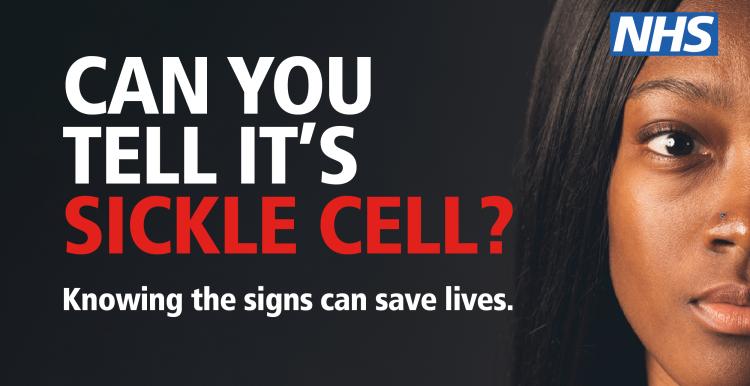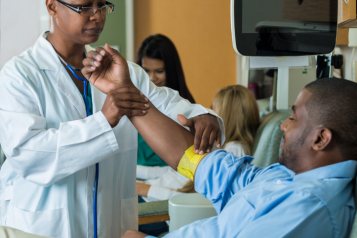What is sickle cell?

NHS England and NHS Improvement have launched a new Sickle Cell awareness campaign.
The campaign, which is part of a bigger drive to improve sickle cell care across the NHS, aims to increase awareness of the key signs and symptoms of a Sickle Cell crisis, particularly among urgent emergency care staff and those living with the condition and their carers.
Anyone can be born with Sickle Cell disorder, but it is most common amongst people from a black Caribbean or black African background
If a person has any of these symptoms, immediate action should be taken as they could be signs of a Sickle Cell crisis or complication:
Acting quickly can save lives.
If someone has these symptoms, they should seek urgent medical attention – this may be via A&E, 999 or their local haematology unit – and should be treated immediately. Patients admitted to the hospital for sickle cell complications should be referred promptly to and treated by haematologists or clinicians with expertise in sickle cell disorders
Screening and testing for sickle cell disease
Sickle cell disease is often detected during pregnancy or soon after birth.
Screening for sickle cell disease in pregnancy is offered to all pregnant women in England to check if there's a risk of a child being born with the condition, and all babies are offered screening as part of the newborn blood spot test (heel prick test).
Blood tests can also be carried out at any age to check for sickle cell disease or see if you're a carrier of the gene that causes it.
Find out more about screening and testing for sickle cell disease
A new training module for NHS staff has also been launched to support increased knowledge of the condition and how to treat it. The training module also includes information on healthcare inequalities related to the condition: https://www.e-lfh.org.uk/programmes/health-inequalities/
Treatments for sickle cell disease
People with sickle cell disease need treatment throughout their lives. This is usually delivered by different health professionals in a specialist sickle cell centre.
It's also important for people with sickle cell disease to look after their own health using self care measures, such as by avoiding triggers and managing pain.
A number of treatments for sickle cell disease are available.
For example:
- drinking plenty of fluids and staying warm to prevent painful episodes
- painkillers, such as paracetamol or ibuprofen (sometimes treatment with stronger painkillers in hospital may be necessary)
- daily antibiotics and having regular vaccinations to reduce your chances of getting an infection
- a medicine called hydroxycarbamide (hydroxyurea) to reduce symptoms
- regular blood transfusions if symptoms continue or get worse, or there are signs of damage caused by sickle cell disease
- an emergency blood transfusion if severe anaemia develops
The only cure for sickle cell disease is a stem cell or bone marrow transplant, but they're not done very often because of the risks involved.
Read more about how sickle cell disease is treated and living with sickle cell disease.
Support in Greenwich
The Sickle Cell and Thalassaemia Service provides:
- Antenatal and neonatal screening and counselling for carriers, those who have a haemoglobinopathy and their families.
- Sickle cell clinics for children and adults.
- Home visits for all newly diagnosed new born babies, new clients moving in from out of area, service users following A&E attendance or hospital discharge and blood test result information.
- Advice and information to service users.
- Support groups.
- Education and training to other professionals.
Who to contact
020 8320 5711 or 020 8320 5712
Opening times:
Monday - Friday
09:00 - 17:00


